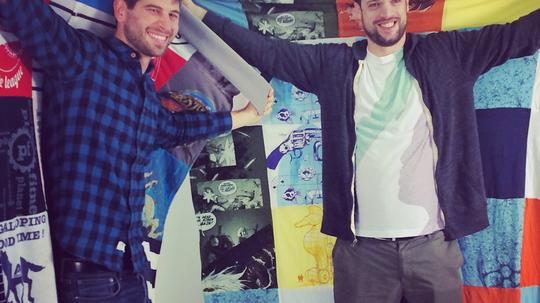
Project Repat - a company that turns old T-shirts into blankets - has garnered a fair amount of publicity in the past several years because of their commitment to bringing textile manufacturing jobs back to the U.S. While its social mission deserves much applause, the scrappiness of this startup’s founders is nothing to scoff at, either.
Nathan Rothstein and Ross Lohr, both Massachusetts natives and local college alumni, have been working the social impact grind for some time now. In addition to completely pivoting their product, they’ve also been bootstrapping their business for years - and it hasn’t been held back despite a lack of outside funding.
Pivoting while staying true to its story
Both Project Repat Founders have a history of giving back. Rothstein was an Americorps volunteer in New Orleans, while Lohr had founded a nonprofit to aid educational development in Tanzania while he was still at BU. It was their innate inclination to help other that brought both of them to Brandeis’ Heller School, where they met but eventually dropped out of.
When Lohr and Rothstein started Project Repat - which was inspired by Lohr’s time in East Africa where he would see people wearing used T-shirts from the U.S. - they were taking a different approach. They were still recycling tees, making them into other items like bags and scarves. But when the two founders went to sell the sustainable swag at markets here, no one was buying.
“We would tell people where they were made and all of the things they support, but - if people were still listening to us at the end - they would say they didn’t want to buy anything,” Lohr began.
“Building a business on a cause doesn’t always work out,” Rothstein said. “ You can’t rely on a story for people to buy.”
“We only needed to be told the same thing a certain number of times before we had to listen and change,” Lohr continued. “We had to create a product that offers value to people, so they’ll want to pay for it. The story doesn’t really matter. The story is a good one, but people buy because it’s a great product that they want and it’s at an affordable price.”
That’s when Project Repat pivoted to what it is today. They quickly realized that customers have their own stash of old T-shirts sitting at home with no use anymore. Now, the company offers to take people’s tees off their hands and have well-paid workers in factories in both Massachusetts and North Carolina make the clothing into something customers would actually use - a blanket. With this shift, Project Repat has maintained its initial mission of recycling textiles while increasing American manufacturing jobs - just in a way that appeals to consumers.
Rejection made this startup stronger
Fortunately, the exchange of used tees for a new blanket is so attractive to buyers that the startup keeps growing, and without a continuous flow of financial backing from firms.
That’s not to say that Rothstein and Lohr didn’t try to raise a round of funding. They did. However, they didn’t get anywhere, and that’s OK.
“The other part of our story was that a couple of years ago, we headed out to San Francisco and were trying to raise money,” Lohr started. “We were honestly pitching over our heads. We were planning on taking unused inventory at clothing stores, turning them into other products and then trying to sell them.”
“We had no business pitching that idea because neither of us had the experience to run a business like that,” he continued. “No one wanted to give us any money. But that made us scrappy, and we turned inwards to figure out how we could bootstrap on our own.”
The San Francisco experience wasn’t an isolated incident on the rejection front. Project Repat was turned down by MassChallenge not once, not twice, but thrice. While other startups could have taken that as a repeat sign to throw in the towel, it didn’t deter this company.
MassChallenge "kept telling us to come back and then they kept rejecting us. The feedback was all over the place,” Rothstein said.
“We’d hear that it’s a niche product that’s never going to scale,” he elaborated. “But then we’d also hear that if it gets too big, someone bigger will come in and eat us up. It never made sense. Which is it: Are we going after something too small or too big? We just continued to do what we were doing.”
And it's been working for them. Lohr said that they have about 1,000 quilt orders a week at this point, and they’ve been doubling in size every year. That’s translated creating textile manufacturing jobs for around 50 people, which is up from the three or four people they had when they first started off.
Rothstein and Lohr don’t see this slowing down. The more people who find out about their quilts, which ring in around $75, the more they anticipate to scale, add factory jobs to the American economy and decrease the amount of textiles contributing to waste each year.
Image via Nathan Rothstein.








